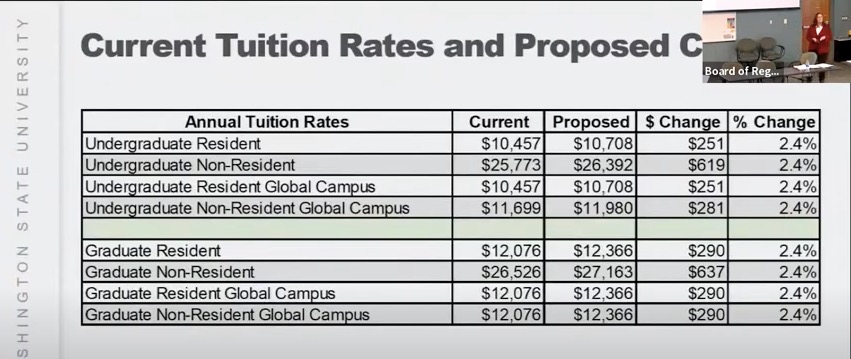Board of Regents justifies 2.4% tuition increase
WSU Athletics expects to spend $1 million over projected revenue; SRC fee increases for first time in four years
WSU will increase tuition rates by 2.4%, the maximum amount allowed by law, to stabilize the university’s budget amid rising inflation and declining enrollment.
May 12, 2022
The Board of Regents voted unanimously on May 6 to increase tuition by 2.4% for the 2022-23 academic year for undergraduate and graduate students.
Increasing tuition rates by the maximum amount allowed by law will stabilize the university’s budget as inflation rates rise to a 40-year high, said Stacy Pearson, vice president of finance and administration.
Pearson said WSU expects enrollment rates to decline for a third consecutive year, and increasing tuition revenue is necessary. The tuition increase will also provide funding for WSU employees’ salary increase next year.
Expansion of financial aid programs, like the Washington College Grant and Federal Pell Grant, will help offset the “modest” tuition increase, Pearson said.
Vice Chair Lisa Schauer said she empathizes with students concerned with debt, living expenses and mental health. When she attended college, she had to call multiple credit card companies to find available funds to pay her tuition.
“I know what it feels like to be a first-generation student who’s barely hanging on to pay for tuition – the impact is great,” Schauer said. “[Two point four percent] may not be a huge deal to someone and may not be a huge deal as I sit in my seat right now, but it is a huge deal to a lot of people. It makes or breaks their ability to continue to stay [at WSU].”
The board also approved housing and dining rates for next year with a majority vote. Residence hall rates will increase by 4%, charging students $266 to $376 more than last year. Monthly apartment rates for single students and families will increase by 5%, according to the board’s housing and dining rates proposal.
Student Regent Shain Wright said higher housing costs render the almost $40 increase in graduate students’ stipends ineffective. Wright said a lack of representation for graduate students is “hard to stomach” and was the only board member to oppose the motion.
Additionally, the board approved the athletics budget for the fiscal year 2023 in compliance with statute RCW 28B.15.120.
President Kirk Schulz said the budget is balanced, but the WSU athletics department expects to spend $1 million more than its projected revenue next year, according to the board’s budget documents.
To cover debt at the end of the year, the university will temporarily transfer $75 million from Housing and Dining Services and Parking and Transportation Services to the athletics fund. Schauer said this motion will be reversed at the beginning of fiscal year 2024.
The board also approved a 3.5% increase in the Service and Activities Fee for the 2022-23 academic year, raising the cost by $19. WSU Pullman will implement the highest increase of this fee compared to other WSU campuses, according to the board’s presentation.
A 4.46% increase in the Student Recreation Center fee was also approved by the board. This marks the first time WSU has increased the fee in four years, according to the presentation.
Saichi Oba, vice provost for enrollment management, said the 24% decline in enrollment for community colleges – where most WSU students transfer from – will reduce the university’s transfer student population this year. There will be 100 fewer transfer students enrolled at WSU in the fall compared to fall 2021.
Chair Marty Dickinson said WSU is providing monetary incentives for transfer students and helping them with applications.
“Transfer students are largely the lifeblood of many of our campuses at WSU and make up a critical component of the fabric of who we are,” she said.
First-year student enrollment confirmations have also subsided, but Oba said the university generated a 3.3% increase in first-year applications.
WSU provided application fee waivers, confirmation awards and transportation to Pullman for prospective students, resulting in a 30% increase in people touring the campus this spring, Oba said.
In 2023, Oba said WSU plans to use the Common Application and its original application to improve enrollment rates for non-resident students. WSU will join University of Washington, Central Washington University and Western Washington University in launching the Common Application in the fall and making its application process more accessible.










